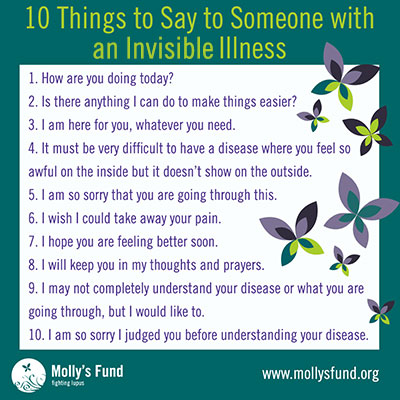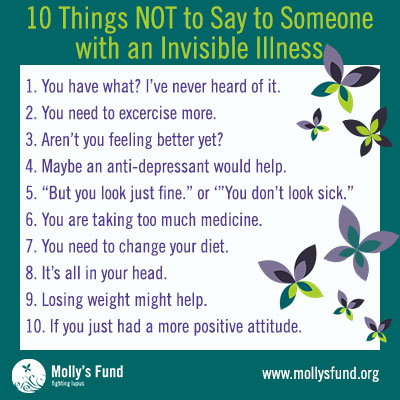Let’s get some respect for people with invisible illnesses here, OK? The Molly’s Fund blog has an explanation about invisible illness that you should go read. That link is courtesy of @pfanderson – thank you!
However, that post has two images of things to say and things not to say to someone with an invisible illness, and there is no alternative text (alt text) for those who cannot read the text in the image. Therefore, I am posting them here with some alt text.
10 things to say to someone with an invisible illness
I confess that I have a quibble with some of these, but I will say that 1, 2, 3, 9, and 10 are definitely spot on.
- How are you doing today?
- Is there anything I can do to make things easier?
- I am here for you, whatever you need.
- It must be very difficult to have a disease where you feel so awful on the inside, but it doesn’t show on the outside.
- I am so sorry that you are going through this.
- I wish I could take away your pain.
- I hope you are feeling better soon.
- I will keep you in my thoughts and prayers.
- I may not completely understand your disease or what you are going through, but I would like to.
- I am so sorry I judged you before understanding your disease.

10 things not to say to someone with an invisible illness
Some of these might get you a “if looks could kill” look. Don’t say these things. Just don’t.
- You have what? I’ve never heard of it.
- You need to exercise more.
- Aren’t you feeling better yet?
- Maybe an anti-depressant would help.
- “But you look just fine.” or “You don’t look sick.”
- You are taking too much medicine.
- You need to change your diet.
- It’s all in your head.
- Losing weight might help.
- If you just had a more positive attitude.

The Great Spoon Theory
Number five on the NOT list brings me to the spoon theory. You don’t really need the pictures or lists. You just need spoons. The best ever explanation about invisible illnesses that I share again and again and again and again is The Spoon Theory by Christine Miserandino. Read it and follow it. People I know who have invisible illnesses say it is awesome. Excellent example of storytelling and clear communication about a tricky subject.
You never know
This is a story I have never before discussed because it is embarrassing, but to emphasize my point, I will now. Several years ago, I had walking pneumonia. I had a cough that stuck with me for 8 whole months. The first couple of months while I was still battling those dratted Mycoplasma pneumoniae, I could have coughs so violent and so sudden that… I wet myself. I was, of course, mortified and stayed home for several weeks. Luckily, I could work from home. I was bored out of my mind with the illness so work was a relief although I could only work for about an hour and then go rest for an hour. When I finally dared leave the apartment to walk about 300 meters to the grocery store (oh, I wasn’t contagious by this time – I just couldn’t shake the cough), I could not cross the street at the traffic light in one go. I walked so slowly to avoid triggering a coughing episode. I walked like a 90-year-old with a walker – but I had no walker and I am not 90. I looked fine. I felt like crap. Cars waited for me to cross to the island in the middle of the road where I could wait for the next green light. Oh how I felt their impatience with me. I was never bothered much by people walking slowly before (with the exception of slow-walking tourists), but you can bet I have the greatest respect and sympathy for them ever since my slow-walking episodes. Been there, done that. Not recommended.
I am fine now, but this one incident hammered home the point for me that you should never ever ever judge a person with an invisible illness. I confess that anytime I encounter someone dissing someone with an invisible illness, I feel like a lioness whose cubs are threatened. Don’t mess with me! 🙂 I follow number three on the things to say list.
What does this have to do with communication?
Everything. It is interpreting what others do and how they behave. You do not know everything about others. Not unless you ask. Talk to people. Ask. Ask politely. Show respect. That is what we owe everyone around us. After all, isn’t respect what you want for yourself?
